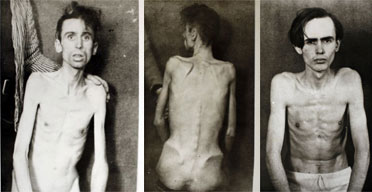Monday, September 04, 2006
Timeline
Monday, April 03, 2006
UK torture camps after ww2

Photographs of victims of a secret torture programme operated by British authorities during the early days of the cold war are published for the first time today after being concealed for almost 60 years.
more: The Guardian
Saturday, January 21, 2006
The Poisoning of the Well
Of Paradoxes and Manna from Heaven
By Manuel Valenzuela
01/19/06 "ICH" -- The rise of Christian fundamentalism in the United States is a profound paradox, a reality that in the natural evolution of human endeavor should not exist, an anathema to the inevitable progression of humanity and civilization, a manifestation that is at odds with what we would expect to exist in the wealthiest, most open and some would say the most learned nation the world has ever seen. Yet, not only does this variant of extremist religion exist in the land of plenty, it thrives, becoming a growing threat to the continued vitality of the nation.
Indeed, a movement already clandestinely growing and attracting more souls before 9/11 was given a gift from the heavens, quite literally, on that fateful day, creating images and emotions that transformed the way millions of Americans saw the world. Suddenly, and unexpectedly, terror fell from the sky like the vengeance-filled thunderbolts of Zeus, spawning a fear and insecurity never before seen inside a nation that had never been attacked on its continental soil. The world was transformed, along with the psyches of millions of people whose beliefs ratified in their minds that the destruction of the World Trade Center was a religious manifestation conjured up by God himself. Paranoid, afraid, uncertain and insecure, thinking themselves living in a troubled world on the verge of its last throes, millions traumatized by the events of 9/11 turned to fundamentalist religion for the salvation reserved for the end of days, answers to most troubling questions and the false comfort that religion offers in times of cataclysm and need.
---more: Essays & Articles
Wednesday, December 14, 2005
Ahmedinejad denies Holocaust!
That means, that the priests in power in Tehran has just placed themselves in the same category as neo-nazis and the like. That is what everybody should know, and take extremely serious. If the current Iranian regime gets nuclear weapons, you are dealing with nukes controlled by nazi-like people. This should of course be prevented, by all effective means.
An invasion by US is out of the question, if it resembles the invasion of Iraq. Israeli air-strikes might very well trigger ww3. So what is the solution?
As far as I know, Iran would need probably 5-10 years to develop nuclear capacity. At the same time, the regime does not seem to be totally stable, with a growing opposition - including priests and clerics no longer supporting the concept of "Islamic State". So the only possibility might be to support this opposition in various ways.
Today they are voting in Iraq, but the outcome of this is very unclear for the moment, I think. If you try to imagine a stable, reasonably democratic Iraq, which is also "Islamic", but in another way than Iran - one could hope that this new model/system could be exported to Iran?
Friday, December 09, 2005
UK helped Israel getting nukes!
This was in conflict not only with the UN but also the policies of USA at that time.
I don't think it is only the arabic world that will be outraged by this news in the near future.
It is probably like pouring gasoline on a fire, I think. You can only expect some kind of explosion.
I guess one of the more important reasons why Iran might be trying to get nukes is - Israeli nukes.
This irresponsible act by UK probably makes nuclear proliferation more likely.
Friday, November 25, 2005
Ukraine demands 'genocide' marked
"The world must know about this tragedy," he said, at the opening of an exhibition dedicated to famine victims.
Millions of Ukrainians starved to death in 1932-33 as USSR leader Joseph Stalin stripped them of their produce in a forced farm collectivisation campaign.
A small number of nations have already recognised the famine as genocide.
source: BBC News
Wednesday, August 10, 2005
1984 (2)
The institutionalization of militarism under the guise of national security was a logical expression of the aspirations articulated by the Council of Foreign Relations before and during the Second World War. This development was recognized by the historian Charles Beard, who charged in 1948 that Franklin Roosevelt had deliberately led the nation to war and knowingly violated the Constitution to do so. Beard warned at that time that Madisonian principles of checks and balances were in jeopardy and that the executive branch would gain control of foreign policy and war making in the postwar period through the expansion of state secrets.